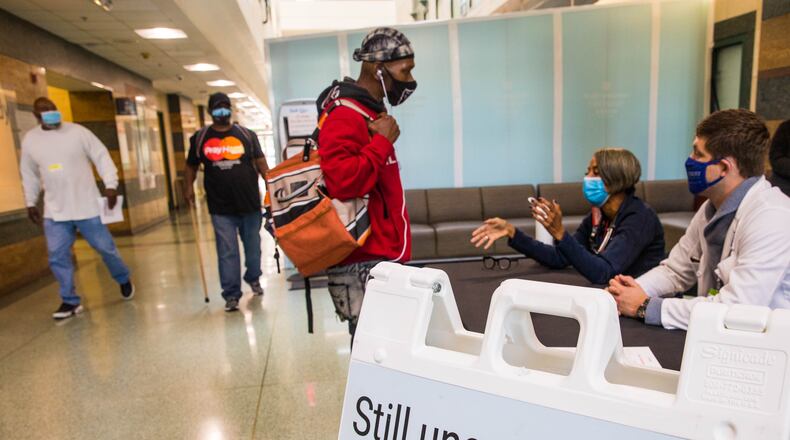As more cases of the omicron variant of COVID-19 are identified in the U.S, there’s little doubt this new coronavirus strain will be detected in Georgia any day now.
Georgia’s public health experts say they’re still searching for the heavily mutated variant and learning about the threat it might pose, but they’re calling for caution, not panic. They say we have far more tools — especially testing, vaccines, and mask-wearing — to battle and weather this new threat, as well as future variants, which almost certainly lie ahead.
“Obviously this is not good news,” said Dr. Felipe Lobelo, an epidemiologist at Kaiser Permanente of Georgia said about the emerging variant. “And it’s certainly unsettling. But even in the worst-case scenario, this does not bring us back to square one.”
Scientists are racing to learn about omicron’s transmissibility, severity and ability to evade vaccines. But even if existing vaccines are less effective against the variant, public health experts say vaccination and boosters might provide enough of an antibody defense to still stave off severe illness and death.
For now, the delta strain, which was responsible for the most recent spike in cases and deaths, accounts for virtually all cases of COVID-19 in Georgia. While it’s unclear if the omicron variant will overtake the delta strain and become the new dominant strain, the current vaccines will fight the current threat from delta. Cases are again on the rise as cold weather and holidays are bringing people together inside.
But the emergence of the omicron variant, public health experts say, is a reminder the coronavirus is likely here to stay and that new variants likely lie ahead. And we must learn to live with it. Maybe forever.
In Georgia and elsewhere, public health workers are using sophisticated machines acquired in the pandemic to perform genetic sequencing on positive samples taken from COVID patients, looking for omicron. Private labs too, which handle most testing and sequencing now performed, are also on the lookout and will report their findings to the state.
The Centers for Disease Control said Thursday it has prepared well for omicron and any future variants of COVID-19.
Credit: TNS
Credit: TNS
Genomic sequencing is a complex process done on a small percentage of positive coronavirus samples. The process begins with extracting the genetic material from a positive sample taken from a COVID-19 patient. Then, sequencing machines map out the entire SARS-CoV-2 virus genetic code. The machine can take three days to complete that step, and then scientists must manually review the findings.
Dr. Rochelle Walensky, the CDC director, says U.S. health officials have greatly expanded their capacity to do those genomic sequencing tests, an area in which the U.S. had lagged other nations.
Walensky said the U.S. now sequences 80,000 samples a week, up from 8,000 per week earlier this year. It’s estimated 1 of every 7 positive samples in the country is sequenced to discover which variant is behind the case.
Georgia Department of Public Health spokeswoman Nancy Nydam and private laboratories reported this week that the public and private labs sequence hundreds of samples each week from around from the state, but none have shown the variant as of Thursday afternoon.
In Georgia, the number of sequences performed has dramatically increased over the year from a few hundred in January to over 7,500 in October, and 4,741 in November, according to GISAID, a tracking initiative that provides a global database of genomic sequencing of coronavirus samples.
“At the end of the day, we may look back at this in 30 years and this may be our new normal, and the way we live with the coronavirus will be the like the flu, with regular boosters and the virus changes every year,” said Lobelo, who’s also an associate professor at Emory University School of Public Health. “But we don’t stop society. We forge ahead.”
At an omicron briefing by the Infectious Diseases Society of America Thursday, leaders echoed that theme.
“We’re in a different place than when we were in the past. We have vaccines, we know how this virus is transmitted. We know what we need to do,” said Dr. Carlos del Rio, an Emory University professor and president-elect of the society. " I think it’s really important that we try to continue gathering; but we need to do it safely.”
Del Rio said having a significant portion of society vaccinated — 60 percent of adults in the state are fully vaccinated — means lockdowns are no longer as necessary as they were when the entire population was vulnerable.
“We need to use all of our tools,” agreed Lobelo, who also pointed to vaccinations, masks, testing and treatment options.
Conditions, circumstances can change very quickly, he said. “The key is you have to be flexible,” he said. “And you have to adapt.”
The Latest
Featured






